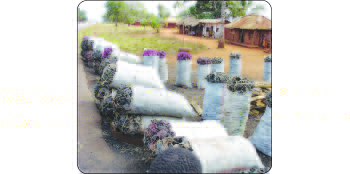By KASONDE KASONDE –
THE impact of climate change cannot be ignored by the human race any longer as it is felt each and every day by all individuals across the world, forcing every country to come up with solutions for survival.
Global warming and climate change experienced today are being caused by the increase of carbon dioxide (CO2) and other greenhouse gas emissions by humans.
Human activities like the burning of fossil fuels, industrial production increase greenhouse gas levels.
Climate variability and change has become a major challenge to sustainable development in Zambia.
The country has been experiencing droughts and floods recorded in the recent past are threatening bumper harvest.
It was for this reason that Zambia was part of the Paris agreement aimed at addressing challenges of climate change by coming up with a nationally determined contribution.
Countries met in Paris to sign an agreement on what each country had to do to help reduce the impact and causes of climate change.
Zambia has embarked on programmes to contribute to its national mitigation goals which include sustainable forest management, sustainable agriculture and renewable energy and energy efficiency.
Government has started carrying out provincial consultations with stakeholders to build capacity and develop bankable projects to address the impact of climate change by engaging the public.
The Ministry of Lands and Natural Resources held a workshop in Kabwe recently with officers from Lusaka, Copperbelt and Central Province to come up with projects that would address the effects of climate change.
The Permanent Secretary, Trevor Kaunda said provincial administrations working with other stakeholders have to identify projects that would be funded to address the impact of climate change.
He said this in a speech read on his behalf by Director for Environment and Natural resources Godwin Gondwe.
This was during a consultation workshop on the identification of projects and programmes for implementation under the nationally determined contribution to the Paris agreement on climate change in Kabwe.
“Government through my ministry is undertaking provincial consultations with stakeholders on the content of the Paris Agreement to build capacity and develop bankable projects for implementation on climate change,” Mr Kaunda said.
Mr Kaunda said the workshop would serve as a platform for Government to build capacity for its citizens to participate and develop tangible programmes in climate change.
He said Government has a number of ongoing initiatives and was consulting with relevant stakeholders on the signing and ratification of the Paris Agreement on climate change.
Mr Kaunda said actions should aspire to include among others, adaptation priorities mitigation loss and damage as a result of the impact of climate change and other relevant sustainable development actions which have links to both mitigation and adaption.
He called upon all stakeholders in the provinces to actively participate in the important national assignment and provide useful information that would help to develop robust and ambitious programmes and projects as identified in the nationally determined contribution to the Paris agreement.
Mr Kaunda said the prioritised programmes should aspire to contribute to the attainment of the objective of the Paris Agreement, increase the country’s resilience to the adverse impact of climate change and help to promote sustainability at country level.
The United Nations Development programme (UNDP) through the United Nations (UN) joint programme on climate change, is providing financial support for the hosting of workshops.
Meanwhile, Interim Climate Change Secretariat representative Tasila Banda called on the participants to ensure that they contributed towards identifying projects that are worth funding.
Dr Banda said it was important to understand what was being done to address the impact of climate change at the international and global level.
The three provinces came up with measures to address the rapid deforestation in rural areas which had led to climate change because the majority of people depend on the forests for their survival.
To fulfill its obligation under the Paris Agreement and promote sustainable development at country level, Zambia has begun the implementation process.
The country has resolved that the growing of tubers be domesticated, since people in the rural areas engage in mass cutting down of trees for survival and therefore, they need empowerment to diversify.
Charcoal burners would be encouraged and empowered to diversity from charcoal burning to growing tubers such as Chikanda and African potatoes.
Charcoal burners should be advised to form cooperatives that would be funded to grow tubers on a large scale to move away from charcoal burning that not only pollutes the air but also leads to deforestation.
The growing of mushrooms would also be explored in the areas where charcoal burning is on a large scale to fight deforestation and empower the local people who depend entirely on the vice.
It is hoped that with all these measures in place, Zambia would reduce its CO2 emissions by implementing the various projects that would be developed by the public through provincial workshops.







